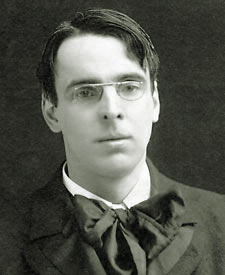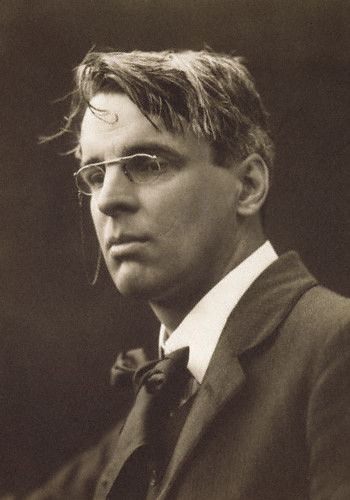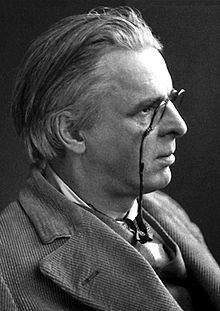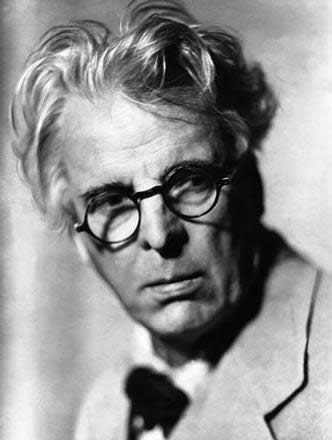So Yeats, what were you bellyaching about?
The poet Yeats often wrote about how dreadful old age was, especially its physical manifestations.
In the poem “Among School Children“, he describes himself as having looked pretty nifty in youth and terrible at sixty:
And I though never of Ledaean kind
Had pretty plumage once – enough of that,
Better to smile on all that smile, and show
There is a comfortable kind of old scarecrow.
And in “Sailing to Byzantium” Yeats wrote:
An aged man is but a paltry thing,
A tattered coat upon a stick,
unless Soul clap its hands and sing, and louder sing
For every tatter in its mortal dress…
Then there’s “The Tower“:
What shall I do with this absurdity””
O heart, O troubled heart””this caricature,
Decrepit age that has been tied to me
As to a dog’s tail?
I know and love these poems, but I really never knew what Yeats himself looked like. I figured, though, that when I searched, I’d find some photos of a rather good-looking young man and then some of a decrepit, stooped, wrinkled, gnarled, unattractive old geezer.
So let’s start with the younger Yeats. Here he is as—yes—a rather good-looking youngish man:
But you know what? In that photo he’s actually not all that young. It was taken in 1906, when Yeats was 41, and he could pass for a man in his twenties.
And even in 1911, when he was 47, he looked pretty darn good, somewhat of a cross between Warren Beatty and Daniel Day-Lewis, with just the tiniest touch of gray to add a hint of distinction:
So he must have turned into a sticklike old scarecrow some years later, right? Well, let’s take a look at a photo taken when he was 58:
I still can’t see that he had much to complain about.
Here’s an undated one that must have been taken in his late 60s or early 70s (he died at the age of 73, so that’s the upper limit):
Granted, he has aged. But he still looks like what one might call a fine figure of a man, a forceful presence in mind, body, and spirit.
At the age of 51, after mooning after actress and feminist Maud Gonne for the better part of many decades, Yeats married a 25-year-old with whom he was apparently happy, and yet went on to have affairs with other women till the end of his life. This seems to have been helped along (if only psychologically) by a “rejunvenation” operation, intended to restore male vigor (including the sexual kind), that Yeats underwent at the age of 69 (details here in case you’re interested).
There’s poetry, and then there’s life.





I too admire Yeats. A poet with a not untypical troubled soul, who never found a grounded center, what contentment could old age offer?
“It is myself that I remake”. It seems to have been a major theme in his life. I never heard about the “rejuvenation” operation, but it figures.
From the Wikipedia entry on Maud Gonne:
The photos of her there put me in mind of Vanessa Redgrave, and made me wonder why Hollywood has never done a Yeats-Gonne movie. Or has it?
Withering rhymes, withering times, my dear Yeats?
My versicle for your verse.
Sincerely,
Keats
Up until, say, the last several decades in our society the old were generally, to some extent, respected and revered, and it was thought that with age came experience, and out of those experiences perhaps came some modicum of wisdom, and the old were often looked to for guidance and counsel.
When families back then were more tight-knit, were less mobile and often lived close together, there were more multi-generational families, with women and other family members staying home to work and not going out, it was very common for families to take care of their elders, and not to just ship them off to some impersonal, stranger-run “Sunrise Acres,” there, sometimes forgotten, to rot away and die.
Since religion has weakened and fallen away for many of us, its admonitions to revere our elders and their wisdom have also been diminished in their force and sway.
You can even see this diminishing and change in behavior in how our cemeteries are neglected, for it used to be the custom for family members to make frequent visits to cemeteries where their ancestors were buried, to remember and to honor them, often by ritually cleaning up their grave sites. Once modern transportation and economic developments led to geographically dispersed families, making such visits harder, the custom of these frequent visits and this care of grave sites has generally faded away.
Then, add to the mix a culture fanatically fixated on and devoted to “youth,” and you have a recipe for dismissal and neglect of the old.
The old seen by some leftist ideologues like Ezekiel Emanuel MD, the President’s Science advisor, and his ilk as no longer “useful” to society since, in retirement, they pay lower taxes as compared to their high “maintenance costs”–and are seen as a net loss to society–often dismissively referred to as “useless eaters.”
A utilitarian approach, Emanuel’s “Complete Lives System” which gives priority for medical care to those, from 15 to 40 and in their prime productive and tax-paying years, it is reported will likely be applied under Obamacare, to limit and ration services to seniors as a cost cutting measure.
Given all these developments and today’s atmosphere, would it be any wonder if there were “seniors” who were not happy contemplating their supposed “golden years.”
“mooning after”?
I’m somewhat familiar with the Yeats/Gunne saga, but I don’t think I’ve ever heard this phrase before.
Google images suggests rather varied meanings:
http://www.google.com/search?q=mooning+after&tbm=isch&tbo=u&source=univ&sa=X&ei=PX75UbZ0j-XgA7mFgbgM&ved=0CDsQsAQ&biw=1378&bih=627
Perhaps if Viagra had been available in his time, he would have had a less maudlin outlook.
Being a critical reader, I notice his reference to plumage (the rooster/cock?), the coat on the stick, the dog’s tail…. Maybe he was telling the reader something else. 🙂
“When you are old and grey and full of sleep,
And nodding by the fire, take down this book,
And slowly read, and dream of the soft look
Your eyes had once, and of their shadows deep;
“How many loved your moments of glad grace,
And loved your beauty with love false or true,
But one man loved the pilgrim soul in you,
And loved the sorrows of your changing face;
“And bending down beside the glowing bars,
Murmur, a little sadly, how Love fled
And paced upon the mountains overhead
And hid his face amid a crowd of stars.”
The pram is said to be the death of the muse.
Horny Yeats may be proof.
}}} There’s poetry, and then there’s life….
…And then there’s being a whiny-ass beyotch of an artistic type…
Seriously.
I’ve seen the Japanese de pict graveyard ceremonies where the families of the departed come, put down some offerings, and throw some water over the headstone. But I’ve never heard the same said about Western civilization.
My only exposure to Yeats was in my college freshman English course. I had developed a phobia to English courses in high school, and writing a paper on a Yeats poem merely reinforced my viewpoint of English courses. The professor, credentialed with a Ph.D. from Columbia, was competent. It was that I didn’t respond well to the junior literary critic role that English courses demanded of me.
Perhaps, less than complaining about “looks”, the gripe of aging is rather a complaint about “feels”, i.e., the loss of a once known physical power (kinesthetically known, if you will) — hence limbs as sticks. Vigorous body users (and dancers would be among these, would they not?) might be among the most sensitive to these effects, though anyone could just as well remark them.
Wolla Dalbo,
“Currently, Emanuel is acting as Special Advisor for Health Policy to Peter Orszag, the Director of the Office of Management and Budget.”
“Dr. John P. Holdren is Assistant to the President for Science and Technology, Director of the White House Office of Science and Technology Policy, and Co-Chair of the President’s Council of Advisors on Science and Technology (PCAST).”
Geoffrey–earlier in the Obama administration, before Obamacare was passed, Ezechiel was, indeed, the President’s Health Care Adviser see, for instance, this WSJ article (http://online.wsj.com/article/SB10001424052970203706604574374463280098676.html).
I am 53. Most people assume I am in my mid thirties. But I hurt all over.
Needs more chi gong for life rejuvenation.